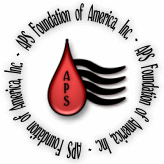
Date: 06/10/2007
Contact: Christina "Tina" Pohlman
Phone: 608-782-2626
Website Address: http://www.apsfa.org
Email Address: apsfa@apsfa.org
Antiphospholipid Antibody Syndrome (APS), is found more often in women than men with 90 percent of all APS sufferers being women.
APS is an autoimmune disease that causes blood clots, premature births and even miscarriages.
Women with APS may have difficulties with pregnancy. During pregnancy, women are at higher risk of developing blood clots and preeclampsia. In APS, pregnancies are thought to be lost because blood clots form in the placenta and starve the baby of nutrition. Some women may have trouble getting pregnant, while others may experience repeated miscarriages. Blood clots that develop in the placenta can cause fetal growth problems, fetal distress, preterm birth, or pregnancy loss.
APS pregnancies are not normal. Normal pregnancy is 40 weeks. In APS, it is more common to deliver the baby between 30-35 weeks, and between 3-5 pounds. Once born, the babies do fine.
Over the long term, many doctors recommend women continue to take a low dose of aspirin to reduce the risk of developing dangerous blood clots. Many women with APS are unaware they have the condition, but it can be diagnosed with a blood test. Doctors may consider the diagnosis when a woman has repeated, unexplained pregnancy loss.
Many women who have problems with APS during pregnancy are completely fine when not pregnant. Others do go on to develop problems with clotting. Currently there is no way of telling which women will be unlucky, until a clot actually occurs.
Infertility has also been linked to antiphospholipid antibodies. Testing for these antibodies is becoming routine in infertility clinics.
The APS Foundation of America is the only United States health agency dedicated specifically to bringing national awareness to APS. We are a volunteer-run, community-based, non-profit organization dedicated to spreading awareness and support to those with the disease.
Knowing more about APS can make all the difference. Get in the know and Get in the Flow!
For more information Contact: Christina "Tina" Pohlman at Phone: 608-782-2626 Website Address: http://www.apsfa.org. Email Address: apsfa@apsfa.org





0 Comments:
Post a Comment